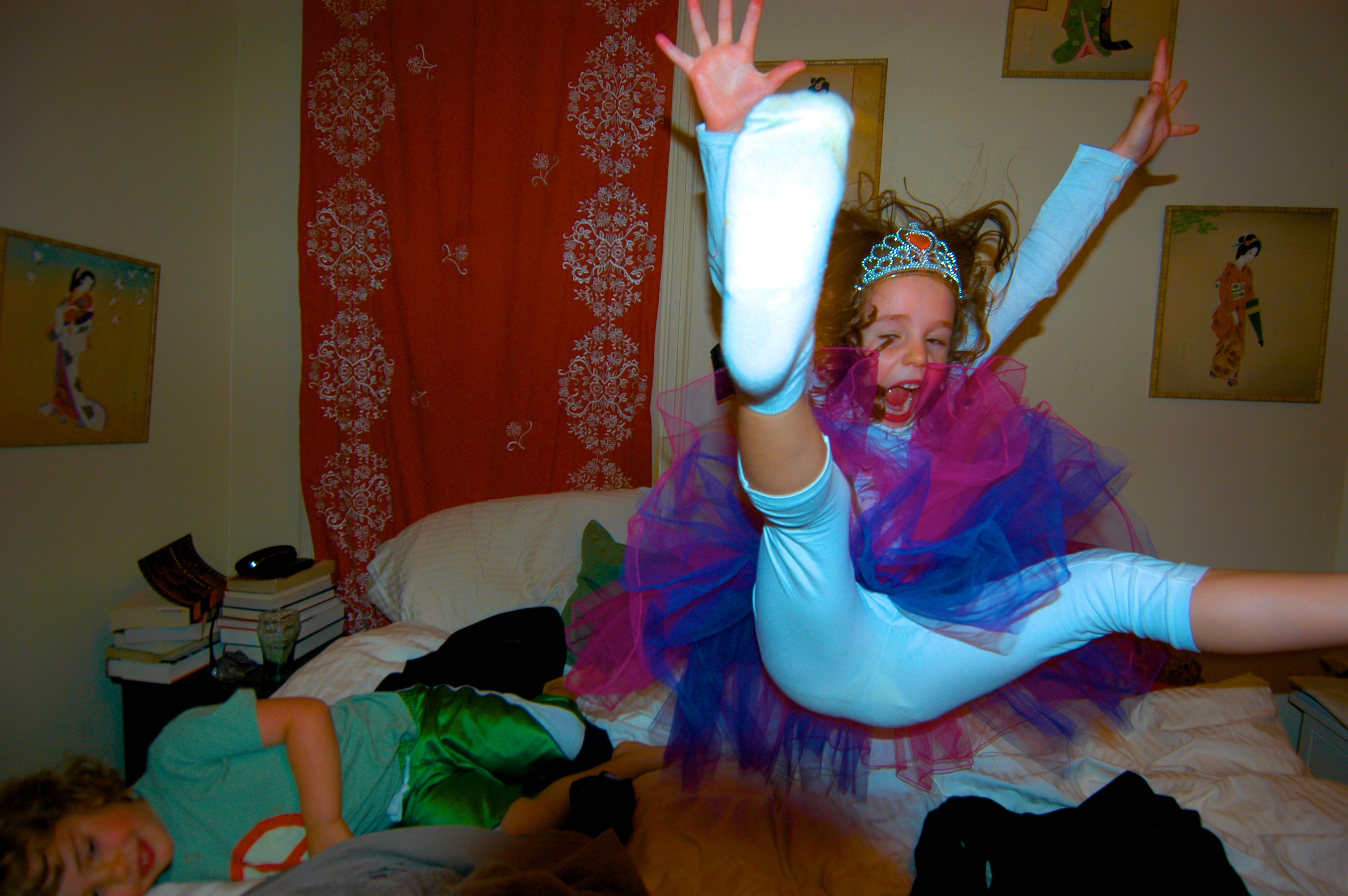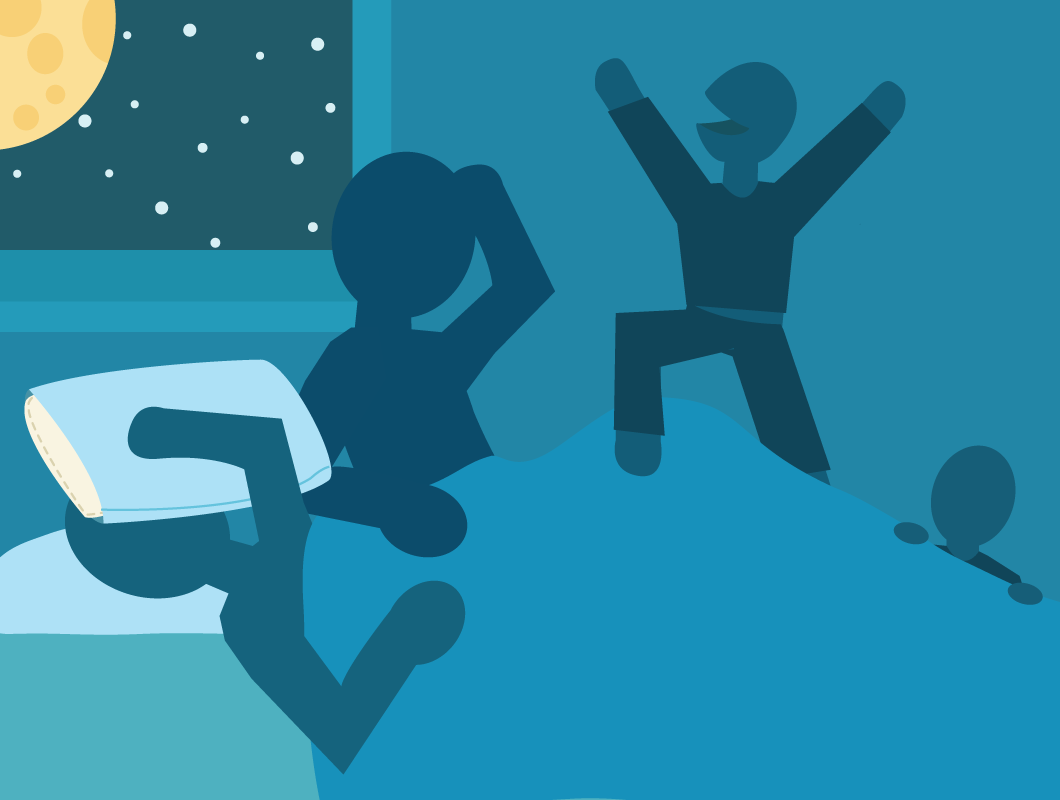
Getting enough sleep plays a vital role in our physical and emotional health, but research shows that many of us aren’t getting the Z’s we need. The culprit? Our kids! Read on to discover the four cornerstones of getting the kiddos—and yourself—a good night’s rest.
Sleep plays a crucial role in overall health and deeply affects quality of life. According to The National Center for Biotechnology Information, chronic sleep deprivation can even increase risk for hypertension, diabetes, obesity, depression, heart attack, and stroke. And long-term sleep issues harm relationships, Theresa E. DiDonato, PhD says in a Psychology Today article. “People who sleep poorly tend to display more negative emotions and are less successful at conflict resolution.”

Unfortunately, according to findings from the 2014 Sleep in America poll conducted by The National Sleep Foundation, children’s poor sleep habits can directly affect the sleep patterns of their adult guardians, and caregivers of kids who sleep the least are more likely to get fewer than 6 hours of shut-eye each night.
So what can you do to make sure your kids hit the sheets at an appropriate hour, slumber peacefully, and allow you and your partner to rest, recharge, and refresh? Cultivate these 4 habits, and you and your crew will soon be boarding the train to Sleepytown.
Signal Bedtime with a Nightly Routine
It’s not possible to simply shut off your brain when it’s time to sleep, but there are certain things we can do to help encourage sleep. In 12 Ways to Shut Off Your Brain Before Bedtime, Margarita Tartakovsky suggests establishing a pre-sleep routine, which signals it’s time to go to bed. Reading a book or taking a warm bath can help, as they are both calming activities that can help you relax and wind down. For kids, try lowering the lights at the same time nightly or turning on calming music throughout the house. Reading a bedtime story not only gives you quality time with your kids, it can signal to them and their bodies that bedtime is nigh.
And for adults and kids alike, soothing a nattering monkey brain as part of the bedtime routine is essential to calming anxiety and ensuring restful sleep. Practicing meditation not only clears the mind, it can actually slow the breathing and heart rate too. Simply sitting still, breathing deeply and regularly, and letting go of stressful thoughts qualifies. And if you or your child still have trouble quieting your minds, take out a pen and paper, and jot down anything that’s worrying you, whether it be your to-do list, your worries at work, or concerns about your family. This type of “brain dump” can help you let go of the thoughts enough to wind down for sleep, as you know you won’t forget them.
Eat and Drink “Smart” to Support Sleep
What we ingest and when has a huge impact on how much, and how well, we sleep. Avoid heavy meals late in the day, and opt for larger lunches and smaller suppers. When your body is occupied with digestion, your systems are going at full-throttle. That means slowing down your metabolism for the night will be delayed. Additionally, you may want to avoid spicy food for your evening meal, as it can cause heartburn, and avoid drinking too much water right before bed, which can have you waking up in the middle of the night to visit the bathroom.
Another obvious roadblock to respite, for both kids and adults, is caffeine. Sleepforkids.org cites the Sleep in America poll, touting, “Of (children) who consume caffeine, nearly three-quarters are school-aged children and close to a third are preschoolers. Consuming caffeine can have a negative impact on children’s sleep.” It stands to reason that stimulants impede rest, so skip the sodas and stick to water or juice when feeding the wee ones.
And for yourself? Limit caffeinated beverages to fewer than two per day, and switch to herbal teas after dark. Even the small amount of caffeine in decaf coffee can disturb the slumber of some. And avoid alcohol—It may help you fall asleep quickly, but it can cause you to wake up more often during the night and may even inhibit REM sleep, so you’ll wake up feeling less well-rested.
Exercise to Prep for a Restful Night
Just as nighttime sleep can affect how well your day goes, daytime choices affect your sleep quality at night. So get your blood pumping while the sun shines to guarantee nightly repose. A study published by The National Institute of Health shows a correlation between engaging in moderate-intensity exercise and sleeping better. And for kids, “every hour of the day children are inactive adds three minutes to the time it takes them to fall asleep,” according to a Medical News Today article.
So why not mobilize your whole family? Instead of vegging out in front of the TV, consider a trip to the playground. And don’t sideline yourself: Join in the fun by doing sprints on the grass, pull-ups on the jungle gym, or pumping your legs on the swing set. Exercising well leads to sleeping well, creating a cycle of healthy days and nights.
Set a Sleep Schedule to Keep Your Internal Clock on Track
Going to bed and waking up at the same hour daily — even on weekends and vacation — solidifies your internal clock. Sleep scientists refer to this clock as your “circadian rhythm.” These patterns are governed by genetic and biological factors, but can be influenced by environment too. That means that practicing good sleep hygiene—Honoring your and your kids’ bedtime consistently—will lead to an easier time falling asleep, and to better sleep quality while your head is on the pillow. As with all health initiatives, the inconvenience may not seem worth it at first. But hey, you manage to show up at work on time, and get your kids to school before the bell. This is just one more example of how a small amount of discipline can lead to a big pay-off.
By prioritizing sleep and giving it the front-row seat in the halls of health that it deserves, you can improve your life and the lives of all the members of your family. If up until now, you’ve subscribed to Benjamin Franklin’s philosophy that “there will be sleeping enough in the grave,” you’d do well to revise your approach. Instead, embrace his other advice: “Early to bed, early to rise, makes a man healthy, wealthy and wise.”

This post is part of our Sleep Month series. Header photo by Chase Guttman.



